Stay in the know on all smart updates of your favorite topics.
Lezing generatieve AI en deepfakes (Dutch)

Kun je nog weten wat betrouwbaar is in tijden van generatieve AI en deepfakes?
Deze Nederlandstalige lezing is bedoeld voor iedereen die meer wil weten over de risico’s van deepfakes (denk aan stemklonen, plaatjes en chatgpt).
Wat is de globale werking, waar kom je het tegen, wanneer moet je extra voorzichtig zijn en wat kun je doen om jezelf te beschermen en manipulaties te doorzien.
How can we, as citizens, designers, and policymakers, regain control over the technologies that shape our cities?

Join us for the workshop: Civic Sousveillance & Democratic Oversight of Sensor Technology.
In this interactive workshop, we explore democratic oversight of camera detection and other urban sensors: from citizen initiatives such as the On Camera pocket guide and smart city camera-spotting tours to current policies on data collection in public space.
With contributions by Tom van Arman & Mike de Kreek from the Human Values for Smarter Cities research project, Inge Janse & Arthur De Jaeger from Centre for BOLD Cities, and council member Elisabeth IJmker from GroenLinks-PvdA. Next to talks we will also go outside for a joint camera-spotting tour around Arcam.
Date: Thursday, January 29, 2026
Time: 4:00 p.m. – 6:00 p.m.
Location: Arcam
Address: Prins Hendrikkade 600
Language: Dutch
Registration: free, but mandatory via the registration form which is here
More info on the Human Values for Smarter Cities research project is here
Everything Urban 001_Interactive Talk for students and young professionals

Everything Urban 001 (LinkedIn Event) is the first in the Interactive Talk series for students and young professionals interested in Urban Affairs i.e. urban planning, urban management, architecture, sustainability, smart cities, to name some. Feel Free to attend it on September 4, 2025. More details in the link.
How to maintain good intentions in the smart city?

During this ThingsCon Salon, we explore how to give good intentions a lasting place in smart city projects. Join us!
On October 29th from 16:00-19:00 we will be at the stunning Scheveningen Pier for a workshop and talks on how to give good intentions a lasting place in government digital projects. Sign up here!
What is the Thingscon Salon about?
When you interact with the municipality, you often first encounter a digital tool: a website, a menu system, an algorithm, or a parking scan car. There are important reasons behind such digital systems: they're convenient and often efficient.
But if things go wrong, citizens shouldn't get lost in the digital reality. That's why the municipality promises its residents, for example in a coalition agreement, the human dimension in the digital city. And according to project plans, a digital tool should be fair, accessible, transparent, and just.
These kinds of good intentions are formulated before or at the beginning of development processes, but can sometimes slip out of view along the way. During procurement, development and implementation, choices are made that later seem to clash with the original intentions.
How do we design so that good intentions remain leading not just at the beginning, but also during execution?
During this ThingsCon Salon, we explore how to give good intentions a lasting place in government digital projects. Using one or two case studies, we'll develop concrete methods in a workshop to make intentions tangible and maintain them throughout the entire process – from administrative agenda to technical implementation and practical, daily use.
This Salon is co-organized by the 'Human Values for Smarter Cities' project from the Amsterdam University of Applied Sciences and Smart City The Hague. The program consists of a workshop and several speakers.
Tessa Steenkamp and Mike de Kreek will host the workshop.
Date: Wednesday October 29th
Time: 16:00-19:00
Location: Infopunt Scheveningen
Urban Clean Air Roundtable

I'm reaching out to warmly invite you to join an upcoming roundtable we’re organizing on Tuesday June 17th focused on clean air in cities (Flyer is attached).
Given Amsterdam InChange's strong role in engaging professionals and communities in environmental monitoring, we believe your perspective would be highly valuable in the conversation. We also see this as a great opportunity to share your work and connect with other researchers, policy makers, and civil society actors active in the clean air space.
The content is a round table session, in which we share what is being worked on and what possible future developments are from different perspectives. The program for the day:
- 11:00 Welcome
- 11:15 Introduction
- 11:30 Presentations on current research/ policies
- 12:45 Lunch
- 13:30 Brainstorm: what-else-can-we-do-and-who-would-we-need-for-that?
- 14:45 Closing up with ten-agreements-plan
We still have a few speaking opportunities available, so if you or someone from your team would be interested in presenting your work or simply joining the discussion, we’d be delighted. Please feel free to email me or my colleague Sanne (sanne.van.breukelen@cenexgroup.nl) directly if you'd like more details or if you’d like to participate.
Hyperlink

Op zaterdag 14 juni organiseren Waag Futurelab en PublicSpaces Hyperlink: een dag waarop je kunt maken, ontdekken en meedenken - op weg naar een beter internet. Hier leer je in een Augmented Reality (AR) game hoe je nepnieuws herkent, fix je jouw data-slurpende telefoon, maak je jouw eigen slimme deurbel, en nog veel meer.
Programma
Deuren gaan open om 14:00 uur. Doorlopend zijn er workshops en exposities te bezoeken, en vanaf 16:00 uur starten ook de verschillende talks.
Workshops
De slimste deurbel
Weet jouw deurbel alles van je buren? Of juist van de privacywetten? Welke deurbel plaatst de grappigste opnames op het internet? Kunstenaar Roos Groothuizen neemt je mee in de wereld van slimme deurbellen, en dan ga je zelf aan de slag! Wie ontwerpt de slimste deurbel?
Escape Fake - een AR escaperoom over nepnieuws
Via een Augmented Reality game stap je in een virtuele wereld waar je in raadsels en puzzels leert desinformatie te onderscheiden van betrouwbare informatie op het internet. Stap in het virtuele Museum of Fake met voorbeelden van historisch nepnieuws, of onderzoek desinformatie, phishing en deepfakes in de games The Bus Situation en Trouble with eLiza.
Fix Your Phone Shop
Je smartphone is stuk - en het is niet alleen een gebarsten scherm. Het probleem zit in de apps, het besturingssysteem, de hardware, en het beïnvloedt jouw privacy, je gezondheid en onze planeet. Dat kan anders!
Social Socials Helpdesk
Klaar met je afhankelijkheid van big tech’s social mediaplatforms? Wij helpen je op weg! Welke echt sociale socials bestaan al? Waar moet je op letten? Hoe word je een Mastodont op Mastodon? Zijn Pixelfed en Peertube wellicht iets voor jou? Kom langs voor al jouw vragen.
Expo's
Acid Clouds
Op zoek naar de fysieke impact van onze digitale cloud. De exponentiële groei van ons datagebruik vraagt om steeds meer datacenters, die als enorme blokken ruimte innemen in onze fysieke leefomgeving. Ontwerper Niels Schrader en fotograaf Roel Backaert gingen voor Acid Couds ‘s nachts op pad om de datacenters vast te leggen die nodig zijn om onze digitale wereld draaiende te houden.
Regenerative Tech
Datacenters, energieverbruik, oprakende natuurlijke grondstoffen – technologische innovatie en ons ecosysteem lijken niet samen te gaan. Hoe kunnen we een digitale wereld bouwen die ook onze planeet ondersteunt? Kunstenaars en ontwerpers laten zien dat het wél kan! Met werken van Leanne Wijnsma, Lukas Engelhardt, Rein van der Woerd en Sunjoo Lee.
Talks
Achter de schermen van onze telefoons
<em>16:00 uur - VPRO Tegenlicht mini-meetup met Chris Vijn</em>
Chris Vijn is regisseur bij VPRO Tegenlicht, en vertelt in deze mini-meetup over de aflevering <em>Zo bevrijd je je smartphone van big tech volgens Marleen Stikker</em>. Samen gaan we in gesprek over hoe je de digitale wereld in beeld brengt.
Hoe ziet het internet er nou echt uit?
<em>17:00 uur - Niels Schrader & Judith Veenkamp</em>
Met <em>Acid Clouds</em> onderzoekt ontwerper Niels Schrader hoe het internet eruit ziet in onze fysieke wereld, met een fotoserie van de datacenters in Nederland en portretten van de grondleggers van ons internet. Samen met Judith Veenkamp (Waag Futurelab) praten we over hoe het internet er nu uit ziet – en hoe we willen dat het eruit komt te zien.
Mesh networks
<em>18:00 uur - Radical Data Collective & Pourya Omidi</em>
How can we create a resilient internet alternative for when central services cut out?
Is het (AI) kunst of kan het weg?
<em>19:00 uur - Laurence Scherz & Ola Bonati</em>
ChatGPT als je therapeut, deepfakes, en plaatjes van mensen die nooit bestaan hebben. Wat gebeurt er nu AI zich diep in onze teksten, beelden en zelfs sociale leven wortelt? Onderzoeker en schrijver Laurence Scherz vertelt over de verwachtingen, angstbeelden en dromen die we misschien wel hebben over AI. Samen met Ola Bonati (Waag Futurelab) onderzoeken we wat het betekent als grote commerciële algoritmes creatief werk overnemen.
Op naar een beter internet
Wat is jouw eerste herinnering van ‘het internet’? Een bezoek aan de Digitale Stad (DDS) via een Telnet verbinding, de dansende banaan van Hyves, chatten op MSN of het downloaden van muziek Napster of Limewire voor je mp3 speler of diskman.
Wat je herinnering ook is: grote kans dat je eerste herinnering een beter gevoel geeft dan het internet waar je nu dagelijks gebruik van maakt. We betalen met onze data, zijn verslaafd aan scrollen en hebben steeds meer te maken met desinformatie, haatspraak en politieke manipulatie op sociale mediaplatformen. Het huidige internet kenmerkt zich door een aantal grote techbedrijven die de regels bepalen. We zijn meer dan ooit afhankelijk van sociale mediaplatformen van big tech en die bedrijven raken steeds meer verweven met politieke macht. Het moet en kán anders - bij Hyperlink ontdek je hoe!
Toegankelijkheid
Mocht je krap bij kas zitten en wel graag aan dit evenement willen deelnemen, neem dan contact op met claudia [@] waag [punt] org.
PublicSpaces conferentie 2025: Shaping our Digital Future
Wil je je verder verdiepen in het onwerp van een beter internet? Kom op vrijdag 13 juni naar Pakhuis de Zwijger voor de vijfde editie van de PublicSpaces conferentie!
Dit evenement is een onderdeel van de ToekomstTiendaagse van 12 t/m 21 juni 2025, een programma in het kader van de viering van Amsterdam 750 jaar.
Waag Open: de slimste deurbel
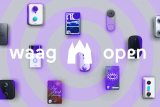
Weet jouw deurbel alles van je buren? Of juist van de privacywetten? Welke deurbel plaatst de grappigste opnames op het internet? Kortom; wie heeft de slimste deurbel?
Een op de vijf huizen in Nederland heeft inmiddels een slimme deurbel, met als populairste deurbellen die van Amazon (Ring), Google (Nest) en het Chinese Anker (Eufy). Maar de slimme deurbel heeft ook een keerzijde; geen van die fabrikanten toont een oprecht initiatief om het ontwerp van hun producten op de Nederlandse privacywetten aan te passen. Ze slaan beelden veel langer op dan het advies van de Autoriteit Persoonsgegevens (AP), laten het nooit merken als ze filmen, hoogstens met een sticker die voorbijgangers op de hoogte zou moeten stellen van actief cameragebruik.
Tijdens Waag Open: De slimste deurbel bespreken we de recente ontwikkelingen rond de slimme deurbellen met ontwerper Roos Groothuizen. Ook ga je aan de slag met je eigen slimme deurbel! Aan welke voorwaarden wil je dat jouw slimme deurbel voldoet? Bouw je een slimme deurbel die helemaal in lijn is met privacywetten? Een deurbel die het buurtgevoel versterkt? Of misschien juist een bel die meteen alle beelden automatisch op internet zet?
Programma
| 19:30 - 19:45 uur | Welkom en intro |
|---|---|
| 19:45 - 21:15 uur | Presentatie Roos Groothuizen |
| 21:15 - 21:30 uur | Smart Deurbel ontwerpen |
| 21:30 - 22:00 uur | Nabespreking en borrel |
Remote Sensing (Satellites), Vrijheidscollege

Dimitri Tokmetzis (1975) is a historian and investigative journalist. He leads the data team of Follow The Money and wrote the books Je hebt wel iets te verbergen (2016) and De digitale Schaduw (2012). He is currently very much involved in remote sensing, which allows you to obtain information about a person, animal or thing without making physical contact. In his Freedom Lecture he discusses power and freedom in a time when the sky is full of satellites.
The intention is to end the evening with an interactive debate based on the lecture!
Send an email to SensemakersAMS@protonmail.com if you want to join!
Speculative Design Workshop - Futuring the City with Generative Things
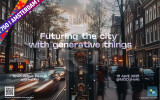
Imagine a world where everyday objects are imbued with the power of generative AI. What possibilities and challenges would emerge? ThingsCon aims to explore this frontier by inviting designers to create provotypes of the near future “generative things”.
To ignite imagination and foster meaningful discussions, we like to use the concept of “provotypes” – provocative prototypes of generative things. These tangible glimpses into tomorrow are catalysts, opening up critical dialogues about our impending relationships with AI-infused objects.
The exhibition “Generative Things” premiered at TH/NGS 2024 on 13 December 2024 in Volkshotel Amsterdam and will travel to other places in 2025, sparking conversations and imagination. ThingsCon organizes this initiative in collaboration with the Master Digital Design of Amsterdam University of Applied Sciences and Waag Futurelab.
15 April. Speculative Design Workshop; An Immersive Future Zine
Connected to Salon, we organize a speculative design workshop where we create a Future Zine that brings the provotypes to life using speculative design methodologies. The outcomes will be used to create immersive experiences with the provotypes that can be presented and discussed with the visitors of the future fest in June.
Preliminary program of the SDW
09:30 Introduction and icebreaker
10:00 Inspirations from the future
10:30 Discuss in groups per provotype possible future scenarios
11:30 Share and sync the different narratives
12:30 lunch
13:30 Create a contribution to the Future Zine
16:30 Share and wrap-up
The Future Zine is proposed as an online publication with immersive capabilities, the framework will be prepared by ThingsCon.
Location
The Speculative Design Workshop will take place Tuesday 15 April at the location of Master Digital Design, Theo Thijssen Huis building, 4th floor, Wibautstraat Amsterdam.
Read more on the backgrounds of the project on the website.
Demoday #27: What is ethical mobile software for your phone?
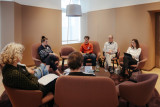
We depend heavily on Big Tech companies like Google, Meta, Apple, Amazon, and more. And with your smartphone, there is no escaping them. Even if you don’t use social media, and use anti-tracking software, some of your data will still be shared and sold. This can make you feel pretty uncomfortable. Especially, since most of these tech companies are in the USA and China. This is why, in this session, we worked on the question: Is it possible to develop mobile software which is ethical and functional?
Danny Lämmerhirt from Waag Futurelab works on the MOBIFREE project. This project aims to change the development and use of mobile software in Europe by citizens, businesses, non-profits and governments. In doing so, they want to support the emerging movement for ethical mobile software consisting of organisations that adhere to European values such as openness, privacy, digital sovereignty, fairness, collaboration, sustainability, and inclusivity.
In this session, Danny introduced us to the smartphone they are working on. This smartphone has its hardware from Fairphone (an ethically produced smartphone) and uses a privacy-friendly operating system: Murena. This operating system is an Android fork that doesn’t come with standard tracking software. On top of that, it has an app store with only ethical apps and is connected to an ethical European cloud.
Outcomes
We discussed with the group what values we found most important in an ethical mobile phone when using it for work. The values that were deemed most important by the group were:
- Autonomy: A smartphone allows working wherever and whenever you want. It is an incredibly powerful tool that you can use for so many different things, and it fits in your pocket.
- Independency: We’ve become incredibly dependent on our smartphones. When you lose your phone, you no longer have your money, your public transport card, a map to find the way, etc. On the other hand, this also means that you don’t need to travel with a bag full of tools every time you leave the house.
- Privacy: Constantly being tracked has become normal, but that doesn't mean we’re happy with it. Right now, you don’t have a choice. It would be nice to have a choice, to either pay with your data, or with money.
- User-friendliness: An ethical and privacy-friendly smartphone sounds great, but it also means that you can no longer use many of the apps that you’re used to. Will it still be practical to use? And will it be intuitive? We are all used to a certain way of working and are hesitant to change.
This discussion was definitely food for thought. We all want a more ethical phone, but are not willing to sacrifice much in return…
Are you interested in trying out this ethical smartphone? The MOBIFREE project is currently looking for people who can test this smartphone. They are looking for young adults, civil servants, mobile software developers, and professionals working in humanitarian organisations.
<strong>Would you like to participate, or do you have any questions about this project? Please contact Noor at noor@amsterdaminchange.com. Special thanks to Danny Lämmerhirt for this interesting session.</strong>
De Staat van het Internet 2025
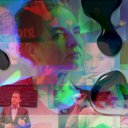
Tijdens de Staat van het Internet steekt Waag Futurelab jaarlijks de peilstok in het internet. In dit 30-jarige jubileumjaar van Waag wordt de lezing gegeven door oprichter en directeur Marleen Stikker.
Nu techmiljardairs toegang tot het Witte Huis hebben, dringt het besef (eindelijk) door dat we extreem afhankelijk zijn van big tech. Met één decreet van Trump of een druk op de knop van Musk is onze samenleving volledig ontwricht. Volgens Rutte, secretaris-generaal van de NAVO, moeten we ons voorbereiden op oorlog. De vraag is of we die oorlog in het digitale domein niet al verloren hebben. Kunnen we onze grip terugwinnen?
Marleen Stikker heeft hierop het antwoord. Tijdens de zevende editie van de Staat van het Internet zet Stikker uiteen hoe we terug kunnen naar een internet waar we zelf controle hebben over de technologie en onze data. Niet het aandeelhoudersbelang of het verdienvermogen van ‘de BV Nederland’ moet centraal staan, maar de weerbaarheid en het handelingsperspectief van Europese burgers, organisaties en democratische instituties.
Dat betekent niet alleen de rug recht houden in het handhaven van de noodzakelijke Europese wetten, maar ook het investeren in kennis en technologie op basis van publieke en democratische waarden, de zogenaamde EuroStack. Er is al een eerste stap gezet door maatschappelijke en culturele organisaties en mensen om minder afhankelijk te worden van grote technologiebedrijven. Welke alternatieven voor big tech zijn er al, hoe maken we deze alternatieven samen tot een succes? En welke rol kunnen sociale en maatschappelijke bewegingen én individuen hier in spelen?
Na de lezing vindt een panelgesprek plaats. Het panel wordt gemodereerd door Dymphie Braun, programmamaker & facilitator die gedreven wordt door de principes van gelijkheid en inclusie. Haar missie is om creativiteit te promoten als middel voor sociale rechtvaardigheid.
Programma
| Inloop | 15:30 - 16:00 uur |
|---|---|
| Lezing | 16:00 - 17:00 uur |
| Panel | 17:00 -18:00 uur |
| Borrel | 18:00 - 19:00 uur |
Panel
Bert Hubert is de oprichter van PowerDNS, software waar een groot deel van het Internet in Europa op draait. Daarnaast werkte hij voor de AIVD. Tegenwoordig doet Bert DNA onderzoek en was hij tot voor kort lid van de Toetsingscommissie Inzet Bevoegdheden Inlichtingen- en Veiligheidsdiensten. Tegenwoordig is hij part-time technisch adviseur bij de Kiesraad, en lid van de commissie van advies van de Autoriteit online Terroristisch en Kinderpornografisch Materiaal.
Savriël Dillingh is marktfilosoof en bedrijfsethicus aan de Erasmus Universiteit Rotterdam. Hij doet onderzoek naar hoe politieke keuzes de vrije markt sturen, en naar hoe een nieuwe, eerlijkere economie er concreet uit kan zien. Savriël publiceerde o.a. in NRC, De Volkskrant, Trouw, Het Parool en De Groene Amsterdammer, en schrijft momenteel over de tirannie van de aandeelhouder.
Tessel Renzenbrink is Communication Officer bij NLnet, een stichting die zich inzet voor een vrij, robuust en open internet voor iedereen. Samen met Ronny Lam maakt ze de NGI Zero podcast waarin ze in gesprek gaan met mensen die bouwen aan het Next Generation Internet. In 2021 werd ze co-directeur van Netwerk Democratie en zette ze zich in voor een vitale democratie in een digitale samenleving. Tessel heeft een master filosofie en maakte in 2020 een post-collapse mesh netwerkapparaat als eindproject voor de FabAcademy.
Over Marleen Stikker
Marleen Stikker is oprichter en directeur-bestuurder van Waag Futurelab. In 1993 stond zij aan de wieg van het internet als 'burgemeester' van De Digitale Stad. Waag is sinds de oprichting in 1994 uitgegroeid tot een leidend Europees onderzoeksinstituut voor technologie en samenleving. Marleen was betrokken bij de oprichting van o.a. PICNIC, Creative Commons Nederland, Fairphone, Public Spaces en Meentcoop.
Ze is Professor of Practice aan de Hogeschool van Amsterdam, lid van de Adviesraad Wetenschap, Technologie en Innovatie en board-lid van de Amsterdam Economic Board en een van de voorzitters van het Overlegorgaan Fysieke Leefomgeving. Ze is auteur van het boek 'Het internet is stuk, maar we kunnen het repareren'. En heeft een eredoctoraat van de Vrije universiteit en is winnaar van de Felipe Rodriguez Award.
Toegankelijkheid
Mocht je krap bij kas zitten en wel graag aan dit evenement willen deelnemen, neem dan contact op met thieu [@] waag [punt] org.
Voor meer informatie over de toegankelijkheid van de locatie zie de toegankelijkheidspagina van Vlaams Cultuurhuis de Brakke Grond.
Over 30 jaar Waag
Dit jaar bestaat Waag Futurelab 30 jaar. Van het eerste ‘sociale medium’ De Digitale Stad, toegankelijk voor een breed publiek, via het ontwerpen van een duurzame modulaire Fairphone, of de eerste opleiding voor Biohackers in Europa, tot aan een advies aan de staatsecretaris voor Digitale Zaken en een burgermeetnetwerk in Noord-Holland: al 30 jaar werkt Waag aan grip op technologie voor iedereen. Die grip op technologie staat dit jubileumjaar centraal, in onze verhalen en in onze programmering.
Bekijk de eerdere edities van de Staat van het Internet.
<strong>Tickets: https://waag.org/nl/event/de-staat-van-het-internet-2025/</strong>
Smart City Expo World Congress | Barcelona 2024 | Personal highlights
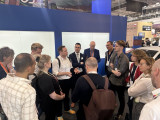
In early November, I travelled to Barcelona for the third time to attend the Smart City Expo World Congress. Together with the Amsterdam InChange Team, some of our network partners, and the Dutch delegation, we put together a strong content-focused programme, gained inspiration, and strengthened both international and national connections. In this article, I’ll briefly share some of my personal highlights from this trip.
International Delegations: Building International Connections and Knowledge Exchange at the Expo
During the congress, I organised several guided visits from the Dutch Pavilion in collaboration with the DMI-Ecosystem. The aim of these visits was to connect the Dutch delegation with international colleagues and facilitate knowledge exchange. At the busy expo, full of companies, cities, regions, and conference stages, it’s really appreciated to join planned meetings on specific themes. It’s also a great chance to meet many international representatives in just a few days, since everyone is in the same place at the same time.
We visited and connected with the pavilions of EIT Urban Mobility, Forum Virium (Helsinki), the European Commission, and Catalonian innovations. Topics such as The Future of Mobility, Digital Twins, and Net Zero Cities were central to the discussions. It was a good opportunity to strengthen existing networks and establish new connections. For myself, for Amsterdam InChange, and for the participants joining the meetings.
A few aspects of the visits particularly stood out to me. At Forum Virium Helsinki we met with Timo Sillander and Jaana Halonen. I was impressed by their work with Digital Twins. They focus not only on the technology itself and the efficiency of urban systems, but also on the social dimensions a digital simulation can play into. Think of; unequal distributions of risks related to climate change and extreme weather conditions.
I also appreciated the efforts of the European Commission. They are working to make it easier to navigate research topics, funding opportunities, and findings related to themes like energy-neutral cities. With their new marketplace, there is more focus on small and medium-sized cities across Europe, helping them to benefit from innovations that are often developed in larger urban areas.
Collaborating Internationally on a Regional Challenge: Zero-Emission Zones and City Logistics
On Tuesday, my colleague Chris and I organised a session on zero-emission city logistics. We brought together representatives from Oslo, Helsinki, Stockholm, Munich, and EIT Urban Mobility, as well as the Dutch municipalities of Haarlemmermeer and Amsterdam.
The session built on connections we made during other events on Sunday and Monday, bringing together an international group of stakeholders interested in this topic. During the discussion, we compared how different cities are approaching zero-emission zones and identified shared challenges, particularly in policymaking and working with logistics companies and local entrepreneurs.
It was interesting to see how this topic lends itself so well to international comparison and exchange. For instance, while Amsterdam will be one of the first to implement a strict ZE zone in the city centre, other cities are already ahead in areas like charging infrastructure and the transition to cargo bikes. The group was eager to keep the discussion going, and we’re already planning a follow-up online meeting to continue learning from one another.
Future-Proof Sports Fields, International Dinners, and Bicycles
Finally, a few other topics worth mentioning: I joined an international session hosted by the City of Amsterdam about future-proof sports fields. It was inspiring to reflect on the value and potential of sports fields for neighbourhoods, as well as their use as testing grounds for sustainable innovations. For me, the session reinforced how important these spaces are for local communities in cities, and sparked a new personal interest in this subject.
I also really enjoyed both our own international changemakers’ dinner and another international dinner hosted by Drees & Sommer (thanks for the invitation!). Bringing together an international network — whether as individuals or in small groups — and mixing them at the table sparked meaningful conversations that felt different from those during the formal congress sessions or workshops.
Lastly, it’s great to see more Superblocks and bicycles in the city every year! Go Barcelona!
Research Interviews Request for PhD Dissertation!
My name is Pınar Ebe-Güzgü, a PhD student at İzmir Katip Çelebi University, Turkey, currently conducting research at the University of Twente. My doctoral research focuses on social justice and disadvantaged groups in the context of smart city applications, with a particular emphasis on the mobility of elderly people (defined by WHO as people over the age of 65).
As part of my research, I conduct in-depth interviews with residents (aged 65+) of Amsterdam, caretakers of elderly individuals, and those working on (or with expertise in) smart city initiatives. The goal is to explore the mobility experiences of 65+ people in Amsterdam and develop policy recommendations to enhance social justice in urban management.
If you would like to share your experiences, your participation in this research would be invaluable. All interviews will be conducted at a time and format that suits you.
Thank you for your time and consideration. Your insights will greatly contribute to our understanding of how smart city applications impact the mobility and quality of life of older individuals.
If you are interested in participating, please reach out to me via the email address below:
p.ebe-guzgu@utwente.nl
Best regards,
Pınar Ebe-Güzgü
𝗛𝗼𝘄 𝗰𝗮𝗻 𝗖𝗦𝗥𝗗 𝗯𝗲 𝘁𝗵𝗲 𝗹𝗮𝘂𝗻𝗰𝗵𝗽𝗮𝗱 for 𝘆𝗼𝘂𝗿 𝘀𝘂𝘀𝘁𝗮𝗶𝗻𝗮𝗯𝗶𝗹𝗶𝘁𝘆 𝗷𝗼𝘂𝗿𝗻𝗲𝘆?
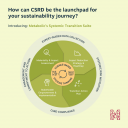
A systems approach is key.
Climate transition plans that lack a systemic perspective can unintentionally shift risks, disrupt supply chains, harm human rights, or even contribute to biodiversity loss. For example, switching to a low-carbon product that requires three times more land may address your carbon goals, but jeopardize your biodiversity targets.
Without considering these interdependencies, your climate strategy may become inefficient and require reworking as new issues arise.
𝗧𝗵𝗲 𝘀𝘆𝘀𝘁𝗲𝗺𝗶𝗰 𝘀𝗰𝗲𝗻𝗮𝗿𝗶𝗼👇
By addressing root causes and considering the ripple effects of climate decision-making in other areas, a systems lens ensures your plan goes beyond regulatory box-ticking.
Together, we can co-create effective action plans with your stakeholders and develop customized decision-making frameworks, accounting for material impacts on climate, nature, and people across your operations and value chain.
How? Learn how our Systemic Transition Suite can unlock your business’s full potential ⬇️
#BeyondCompliance #climatetransition #sustainabilityreporting #CSRD #ESG #circulareconomy
Embassy of Digital Futures: Balanceren tussen Utopie en Dystopie

Embassy of Digital Futures organiseert een expositie op de Dutch Design Week 2024 over superpowers & escaping the algorithm. Op de conferentie: “Balanceren tussen Utopie en Dystopie” gaan we op zoek naar handelingsperspectief.
Er is de laatste tijd veel aandacht voor de polarisatie, mentale gezondheid van jongeren en de toenemende invloed van de big tech. De Embassy of Digital Futures gaat in op de vraag hoe we de ontwikkeling van digitale toekomsten kunnen beïnvloeden. Deze toekomsten bieden een beeld van hoop en nieuwe mogelijkheden. Er komen ‘superpowers’ tot onze beschikking! Deze superpowers hebben echter ook een keerzijde.
Onder het motto "Escape the algorithm" zoeken we naar het handelingsperspectief en verkennen we de ingrediënten voor de volgende vraag in onze zoektocht naar digitale toekomsten.
Na een presentatie van o.a. Koert van Mensvoort verdiepen we ons in de expo van ontwerpers; Julia Janssen, Leonore Snoek, Mayra Kapteijn en Bas Sala waarna een paneldiscussie volgt met onder meer Martijn de Waal, Marcel Thaens en Mieke van Heesewijk.
Klik hier voor meer informatie over de programma’s rondom de Embassy of Digital Futures
Sensemakers Special: Embedded systems security and AI & Antifragility; Enterprise Architecture

This Sensemakers evening we have 2 speakers:
Prof. Dr. Lejla Batina from the Digital Security group of the Radboud University will share here insight on the vulnerabilities in the security of embedded systems in the context of AI
and
Edzo Botjes, Antifragility architect and Security coach, will share insights on resilience, chaos, anti-fragile and Enterprise Architecture.
Dataslots
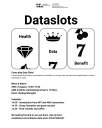
Come play Data Slots!
A board game that fosters conversations on benefits vs. privacy risks for data-driven applications to foster well-being in cities.
When & Where:
29th of August, 14:00-15:45
AMS Institute, Kattenburgerstraat 5, 1018JA,
Room: Beijing/Shanghai
Schedule:
14.00 - Introduction from MIT and AMS researchers
14.30 - Group formation and game session
15.45 - Final remarks and coffee
We looking forward to seeing you there, sign up here:
https://www.eventbrite.com/e/tickets-data-slots-976415604357?aff=oddtdtcreator
Society 5.0 Festival
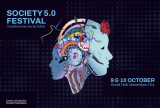
How can we shape the society we want amidst rapid technological advancements? At the Society 5.0 Festival, we believe this demands a radical new way of thinking: a shift from transactions to relations. As creatives, researchers, citizens, technologists, teachers, designers, students, and policymakers, we must actively shape the fabric of our future society. Join us as we listen, nurture, and repair the ties that bind us.
Citizen's preferences and the 15-minutes city

For decades, the behaviour of urban planners and politicians, but also of residents, has been determined by images of the ideal living environment, especially for those who can afford it. The single-family home, a private garden and the car in front of the door were more prominent parts of those images than living in an inclusive and complete neighbourhood. Nevertheless, such a neighbourhood, including a 'house from the 30s', is still sought after. Attempts to revive the idea of 'trese 'traditional' neighbourhoods' have been made in several places in the Netherlands by architects inspired by the principles of 'new urbanism' (see photo collage above). In these neighbourhoods, adding a variety of functions was and is one of the starting points. But whether residents of such a neighbourhood will indeed behave more 'locally' and leave their cars at home more often does not depend on a planning concept, but on long-term behavioural change.
An important question is what changes in the living environment residents themselves prefer. Principles for the (re)design of space that are in line with this have the greatest chance of being put into practice. It would be good to take stock of these preferences, confront (future) residents conflicting ideas en preconditions, for instance with regard to the necessary density. Below is a number of options, in line with commonly expressed preferences.
1. Playing space for children
Especially parents with children want more playing space for their children. For the youngest children directly near the house, for older children on larger playgrounds. A desire that is in easy reach in new neighbourhoods, but more difficult in older ones that are already full of cars. Some parents have long been happy with the possibility of occasionally turning a street into a play street. A careful inventory often reveals the existence of surprisingly many unused spaces. Furthermore, some widening of the pavements is almost always necessary, even if it costs parking space.
2. Safety
High on the agenda of many parents are pedestrian and cycle paths that cross car routes unevenly. Such connections substantially widen children's radius. In existing neighbourhoods, this too remains daydreaming. What can be done here is to reduce the speed of traffic, ban through traffic and make cars 'guests' in the remaining streets.
3. Green
A green-blue infrastructure, penetrating deep into the immediate surroundings is not only desired by almost everyone, but also has many health benefits. The presence of (safe) water buffering (wadis and overflow ponds) extends children's play opportunities, but does take up space. In old housing estates, not much more is possible in this area than façade gardens on (widened) pavements and vegetation against walls.
4. Limiting space for cars
Even in older neighbourhoods, opportunities to play safely and to create more green space are increased by closing (parts of) streets to cars. A pain point for some residents. One option for this is to make the middle part of a street car-free and design it as an attractive green residential area with play opportunities for children of different age groups. In new housing estates, much more is possible and it hurts to see how conventionally and car-centred these are often still laid out. (Paid) parking at the edge of the neighbourhood helps create a level playing field for car and public transport use.
5. Public space and (shopping) facilities
Sometimes it is possible to turn an intersection, where for instance a café or one or more shops are already located, into a cosy little square. Neighbourhood shops tend to struggle. Many people are used to taking the car to a supermarket once a week to stock up on daily necessities for the whole week. However, some neighbourhoods are big enough for a supermarket. In some cities, where car ownership is no longer taken for granted, a viable range of shops can develop in such a square and along adjacent streets. Greater density also contributes to this.
6. Mix of people and functions
A diverse range of housing types and forms is appreciated. Mixing residential and commercial properties can also contribute to the liveliness of a neighbourhood. For new housing estates, this is increasingly becoming a starting point. For business properties, accessibility remains an important precondition.
7. Public transport
The desirability of good public transport is widely supported, but in practice many people still often choose the car, even if there are good connections. Good public transport benefits from the ease and speed with which other parts of the city can be reached. This usually requires more than one line. Free bus and tram lanes are an absolute prerequisite. In the (distant) future, autonomous shuttles could significantly lower the threshold for using public transport. Company car plus free petrol is the worst way to encourage sensible car use.
8. Centres in plural
The presence of a city centre is less important for a medium-sized city, say the size of a 15-minute cycle zone, than the presence of a few smaller centres, each with its own charm, close to where people live. These can be neighbourhood (shopping) centres, where you are sure to meet acquaintances. Some of these will also attract residents from other neighbourhoods, who walk or cycle to enjoy the wider range of amenities. The presence of attractive alternatives to the 'traditional' city centre will greatly reduce the need to travel long distances.
The above measures are not a roadmap for the development of a 15-minute city; rather, they are conditions for the growth of a liveable city in general. In practice, its characteristics certainly correspond to what proponents envisage with a 15-minute city. The man behind the transformation of Paris into a 15-minute city, Carlos Moreno, has formulated a series of pointers based on all the practical examples to date, which can help citizens and administrators realise the merits of the 15-minute city in their own environments. This book will be available from mid-June 2024 and can be reserved HERE.
For now, this is the last of the hundreds of posts on education, organisation and environment I have published over the past decade. If I report again, it will be in response to special events and circumstances and developments, which I will certainly continue to follow. Meanwhile, I have started a new series of posts on music, an old love of mine. Check out the 'Expedition music' website at hermanvandenbosch.online. Versions in English of the posts on this website will be available at hermanvandenbosch.com.
Samenwerken aan transitievraagstukken; wat is er nodig? - Opbrengsten van het Amsterdam Smart City partnerdiner 2024
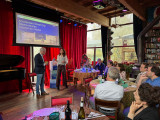
Als Amsterdam Smart City netwerk bijten we ons vast in complexe stedelijke transitievraagstukken. Ze zijn complex omdat doorbraken nodig zijn; van kleine doorbraakjes, tot grotere systeem doorbraken. Denk aan bewegingen rond; organisatie-overstijgend werken, domein-overstijgend werken, en van competitief naar coöperatief. Als netwerk zetten we samenwerkingsprojecten op waarin we gaandeweg ondervinden met wat voor barrières we te maken hebben en wat voor doorbraken er nodig zijn.
Tijdens ons jaarlijkse Partnerdiner op 2 april, hadden we het samen met eindverantwoordelijken van onze partnerorganisaties over de strategische dilemma’s die spelen bij transitievraagstukken. Als gespreksstarters gebruikten we onze lopende onderwerpen van 2024: De coöperatieve metropool, de ondergrond, de circulaire metropool en drijvende wijken. De gesprekken aan tafel gingen echter over wat er aan de basis staat van het werken aan transitievraagstukken. Zo ging het bijvoorbeeld over; het samenwerken aan visies en scenario’s, leiderschap, burgerlijke ongehoorzaamheid en de kracht van coöperaties. In dit artikel bespreek ik beknopt een aantal onderwerpen die onder de aandacht werden gebracht door onze gasten.
Belangen en visie organiseren
Bij een vraagstuk of onderwerp als de ondergrond, gaan we het al snel hebben over de data en de oplossingen. Dat is ‘te makkelijk’. Technisch gaat het allemaal wel kunnen, maar als we daar te snel beginnen met de oplossing lopen we over een aantal jaar weer vast. Het is belangrijk om eerst een stapje terug te doen en een gedeeld belang en gedeelde visie te organiseren.
Hoe je belanghebbenden verzamelt, en de methode om tot een gedeelde visie te komen, dat is wat meer aandacht verdient. Neem het ondergrond vraagstuk als voorbeeld. Op welke schaal organiseer je daarvoor de belanghebbenden? Aan de oppervlakte hebben we Gemeentelijke en Provinciale grenzen, maar in de ondergrond liggen netwerken van kabels en leidingen die op andere schaal zijn geïnstalleerd en hebben we te maken met bodemtypologieën met verschillende behoeften.
Samen voorstellen en voorspellen
Dat waar je naartoe wilt werken, dat moet van iedereen voelen. Het is belangrijk om een setting te creëren van gedeeld eigenaarschap, waarin iedereen zich ook gehoord voelt, en dat je voelt dat de mensen met wie je gaat samenwerken ook voor jouw belangen op zullen komen. Om samen tot een visie te komen, is het belangrijk om te werken aan scenario’s en die samen te doorleven. Je moet het dan niet alleen hebben over waar je heen wilt, maar ook uitwerken wat er gebeurt als je niets doet of als het helemaal verkeerd uitpakt.
De scenario’s zouden op waarden moeten rusten. Het beeld wat bij de scenario’s hoort is veranderlijk, maar de waarden niet. Samen ben je continu in samenspraak over wat de waarden betekenen voor het verhaal dat je creëert.
Leiderschap en een interdisciplinaire werkwijze
Transitievraagstukken en bovenstaande aanpakken verdienen een bepaald soort leiderschap. Zo zou een leidinggevende bijvoorbeeld een veranderlijke en faciliterende houding moeten tonen, en moet hij/zij vanuit waarden werken die inspireren en verbinden. Het zou meer moeten gaan over het faciliteren van doeners, het stimuleren van doelgericht samenwerken in plaats van taakgericht en ruimte bieden voor menszijn en persoonlijke expertises. Met dit laatste wordt verwezen naar een stukje burgerlijke ongehoorzaamheid. Om dingen die we belangrijk vinden in gang te zetten moeten we soms even los kunnen denken van onze organisatiestructuren en functies. We zouden wel wat vaker mogen appelleren aan ons menszijn.
Meer faciliteren en minder hiërarchie helpt ons om beleid en praktijk dichter bij elkaar te brengen, en om van competitief naar meer coöperatief te bewegen. Als je naar de uitvoering gaat mag de kracht verplaatsen naar de uitvoerders. De machtsverschuivingen tussen leidinggevenden en de doeners, met specifieke rollen en expertises, mag in een constante wisselwerking rond gaan.
Ook interdisciplinair samenwerken aan transitievraagstukken zal nog meer moeten worden gestimuleerd, en misschien wel de norm moeten worden. Bij overheden en bestuurders bijvoorbeeld, zijn transitie thema’s verdeeld over domeinen als energie, mobiliteit, etc. maar de vraagstukken zelf zijn domein overstijgend. Als voorwaarde zou je kunnen stellen dat je altijd twee transities aan elkaar moet koppelen. We zouden meer inspirerende voorbeelden moeten laten zien waarbij verschillende domeinen en transities aan elkaar worden gekoppeld, door bijvoorbeeld overheden.
Publiek-privaat-civiel
Publieke, private en civiele partijen zouden nog meer naast elkaar aan tafel mogen, in plaats van tegenover elkaar. Bedrijven kunnen verzuild zijn, of zich zo voelen, en zouden nog meer om zich heen kunnen kijken en samenwerken. Niet alleen met overheden, maar ook met civiele organisaties. Er zijn vaak meer gezamenlijke belangen dan we denken.
In een beweging naar niet-competitief samenwerken kunnen coöperaties een belangrijke factor zijn. Wanneer je meer autoriteit bij coöperaties neerlegt, weet je zeker dat er in de basis voor een wijk, een stad, haar inwoners, een publiek belang wordt gewerkt. Er liggen dan ook veel kansen bij een faciliterende houding vanuit de overheid naar coöperaties toe, en in de samenwerking tussen bedrijven en coöperaties.
Er zijn tijdens dit diner veel onderwerpen aan bod gekomen waar we met het netwerk mee aan de slag kunnen in onze programmering. De input wordt gebruikt voor onze lopende vraagstukken en we gaan de komende tijd in gesprek met partners om te kijken of we van start kunnen met verdiepende sessies of het ontwikkelen van methoden op (enkele van) deze onderwerpen.
<em>Wil je doorpraten over deze onderwerpen, met ons - of een van onze partners? Mailen kan naar pelle@amsterdamsmartcity.com*</em>
Stay up to date
Get notified about new updates, opportunities or events that match your interests.

